
PLANEWAVE
The 20" CDK is a revolutionary new telescope optical system that is designed to excel at imaging on large format CCD cameras while remaining an excellent instrument for visual use.
Διαθέσιμο με Προπαραγγελία

Στην περίπτωση αυτή περιλαμβάνονται προϊόντα που συνήθως δεν κρατάμε σε στοκ και για κάποιους λόγους -που δεν εξαρτώνται από την εταιρία μας- δεν μπορούν να είναι διαθέσιμα σε διάστημα μικρότερο των 14 ημερών.Στην κατηγορία αυτή περιλαμβάνονται και προϊόντα που προδιαφημίζονται από τους κατασκευαστές αλλά δεν άρχισε ακόμη η επίσημη διανομή τους στην ελληνική αγορά. Πιθανόν για τα είδη αυτά να παρέχεται δυνατότητα προπαραγγελίας με ειδική προνομιακή τιμή. Αν γνωρίζουμε ήδη την πιθανή ημερομηνία άφιξης του συγκεκριμένου προϊόντος, στις αποθήκες μας, τότε αυτή θα αναγράφεται ξεχωριστά και επάνω από την ένδειξη «Διαθέσιμο με Προπαραγγελία»
PlaneWave CDK20 ASTROGRAPH F/6.8 WITH FUSED SILICA OPTICS
The 20" CDK is a revolutionary new telescope optical system that is designed to excel at imaging on large format CCD cameras while remaining an excellent instrument for visual use.
One of the unique features of the CDK design is its ease of collimation and achievable centering tolerance for a telescope of its class. This assures the user will get the best possible performance out of the telescope. The end result is a telescope which is free from off-axis coma, off-axis astigmatism, and curvature of field, yielding a perfectly flat field all the way out to the edge of a 52mm image circle.
Features
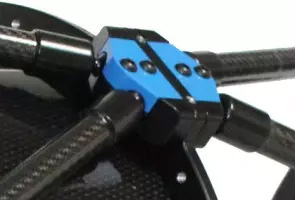 Carbon Fiber Truss Design: Minimizes thermal expansion which causes focus shift as temperature changes during an imaging session. Carbon fiber also reaches ambient temperatures quickly and is extremely lightweight and rigid to help ensure excellent imaging data is produced. |
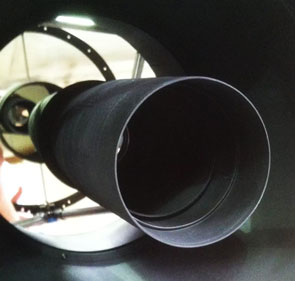
3D Printed Baffles: PlaneWave uses digital 3D printing technology to produce lightweight baffle tubes. 3D printers add successive layers of material to construct a baffle system with precision positioned internal stray light baffles to minimize vignetting and maximize image contrast. Quality baffling makes an incredible difference in overall image quality, so we ensured an optimal design was created for our telescopes. |

Dovetail Expansion Joint: Allows for the difference in thermal expansion between carbon fiber and aluminum. The expansion joint allows the aluminum dovetail to expand and contract without stressing the carbon fiber lower truss. This results in images that are not distorted due to expansion, or contraction of the optical tube materials. |
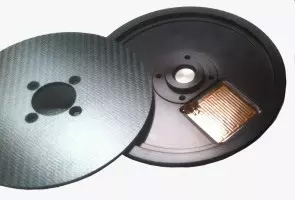
Delta-T Ready: For added dew prevention, the CDK20 is internally wired with polyimide film heater pads and temperature sensor, which is ready to be controlled with the Delta-T via PlaneWave Interface 3 software. |
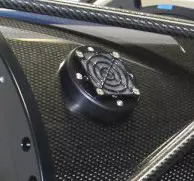
Cooling Fans: Three fans on the backplate of the optical tube pull air through the telescope and by the primary mirror. Three fans on the side of the optical tube also blow air across the primary to ensure a boundary layer of air does not distort images. These fans help the telescope reach thermal equilibrium quickly, further reducing any distortion in images due to temperature variations. The fans are controlled by a switch on the optical tube, or can be controlled by via PWI3 software if a PlaneWave Electronic Focus Accessory (EFA Kit) is purchased. |
Fused Silica
Fused Silica is a synthetic amorphous silica glass of the highest purity and one of the most transparent glasses made. The optical and thermal properties of fused silica are superior to other types of glass due to its purity. Its transmission and homogeneity exceed those of crystalline quartz without the problems of temperature instability inherent in the crystalline form. Fused Silica has a coefficient of thermal expansion six times lower than Borosilicate (Pyrex) glass, which means that as fused silica cools down, it preserves its shape to a high degree of accuracy. This translates into consistent optical performance and unchanging focus over temperature changes. With its high melting temperature ()~ 1.600 degree Celsius), a very low coefficient of thermal expansion and resistance to thermal shock, fused silica is the material of choice for professional observatories as well as various scientific applications.
Spot Diagram
To the right are two simulations showing the CDK's stunning performance. The first is a diffraction simulation and the second is a spot diagram.
In both simulations the small squares are 9x9 microns, about the size of a CCD pixel. In the diffraction simulation the star images on axis and off-axis are nearly identical. In the spot diagram 21mm off-axis the spot size is an incredible 6 microns RMS diameter. For 26mm off-axis, a 52mm image circle, the RMS spot size is 11 microns. This means the stars across the entire focal plane are going to be pinpoints as small as atmospheric seeing will allow.
The spot diagram was calculated at 720, 585, and 430nm. Many companies show spot diagrams in only one wavelength, however to evaluate chromatic performance multiple wavelengths are required. Both of the simulations take into consideration a flat field, which is a more accurate representation of how the optics would perform on a flat CCD camera chip.
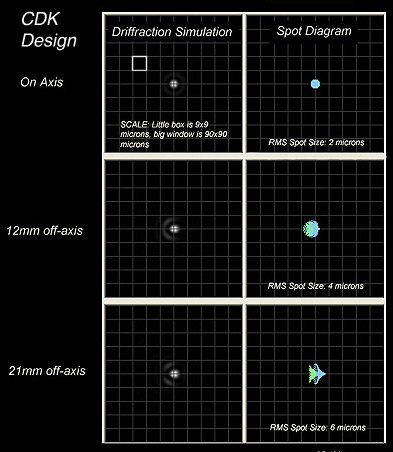
ΣΗΜΑΝΤΙΚΟ:
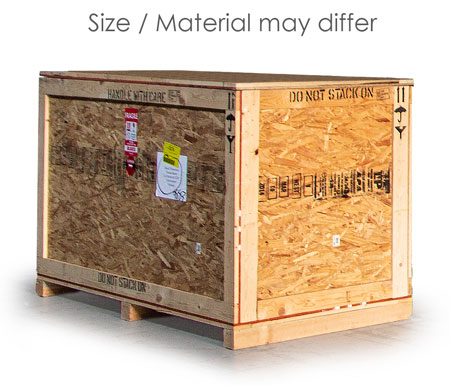 Για την αποστολή του τηλεσκοπίου, απαιτείται η μεταφορά του από το εξωτερικό, με έξτρα κόστος ειδικής συσκευασίας και μεταφορικών. Τα κόστη αυτά αφορούν την μεταφορά του τηλεσκοπίου από το εξωτερικό στην Ελλάδα και είναι ανεξάρτητα από το κόστος μεταφορικών εντός Ελλάδας. Παρακαλούμε, επικοινωνήστε μαζί μας για το συνολικό κόστος.
Για την αποστολή του τηλεσκοπίου, απαιτείται η μεταφορά του από το εξωτερικό, με έξτρα κόστος ειδικής συσκευασίας και μεταφορικών. Τα κόστη αυτά αφορούν την μεταφορά του τηλεσκοπίου από το εξωτερικό στην Ελλάδα και είναι ανεξάρτητα από το κόστος μεταφορικών εντός Ελλάδας. Παρακαλούμε, επικοινωνήστε μαζί μας για το συνολικό κόστος.
| Καθ.Βάρος (γρ.) | 64000 |
|---|---|
| Οπτικός Σχεδιασμός | Κατοπτρικό Dall-Kirkham |
| Διάμετρος (mm) | 508 |
| Εστιακή Απόσταση - F (mm) | 3454 |
| Εστιακός Λόγος (f/) | 6.8 |
| Στήριξη | Δεν περιλαμβάνεται στήριξη ή τρίποδας |
In the box:
Specifications:
Optical Design
Corrected Dall-Kirkham (CDK)
Aperture (mm)
20" (508 mm)
Focal Length
3.454 mm (135.98 inch)
Focal Ratio
f/6.8
Image Field
52 mm
Back Focus Distance
5.8" (147 mm) from Racked in Focuser
Central Obstruction
39% of the Primary Mirror Diameter
Substrate
Fused Silica
Optical length
47 inch (1.194 mm)
Optical Tube Weight
140 lbs (64 kg)